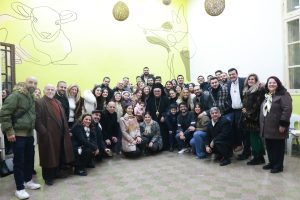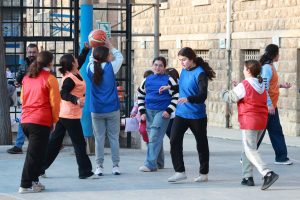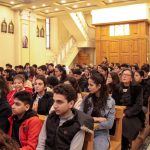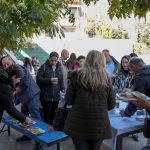In late 2024, a surprise offensive from a coalition of several armed groups caused the rapid collapse of the Government of Syria and its military forces. By December 8, the groups had taken control over almost all areas previously under the Bashar al Assad-led Government of Syria. The events mark a watershed moment for Syria, after enduring more than 13 years of perpetual conflict and instability.
Before this recent escalation, Syria had the world’s second largest displacement crisis, with more than 14 million people forced from their homes. More than 7 million Syrians remain internally displaced—one third of the overall population.
 Years of protracted conflict have devastated Syria’s economy: Between 2010 and 2020, the country’s GDP shrank by more than half, and 90% of the population lives under the poverty line. The ongoing devaluation of the Syrian pound has triggered hyperinflation, pushing basic goods out of reach for many families. Most of the population has become dependent on aid for even the most basic necessities.
Years of protracted conflict have devastated Syria’s economy: Between 2010 and 2020, the country’s GDP shrank by more than half, and 90% of the population lives under the poverty line. The ongoing devaluation of the Syrian pound has triggered hyperinflation, pushing basic goods out of reach for many families. Most of the population has become dependent on aid for even the most basic necessities.
Thus, whilst the end of the Assad-led Government represents a pivotal moment for Syria, potentially offering a new and more hopeful chapter for more than 16 million people in need of humanitarian assistance inside the country, the future remains highly uncertain, especially for ethnic and religious minority groups.
Several international institutions operating on the ground express concerns over the potential reigniting of conflict between non-state groups and the involvement of interest-bearing external actors. While recent fighting in the northwest appears to have largely subsided, hostilities and insecurity continue in the northeast of Syria.
The situation faced by families, in the current circumstances, has unfortunately not shown any signs of improvement, and families are more vulnerable and at risk than ever.
Hostilities have severely impacted civilians and infrastructure, notably damaging water stations and power stations. This has reduced water and electricity access especially in Aleppo. Humanitarian access remains restricted due to closed border crossings and damaged infrastructure, complicating aid delivery. Limited financial liquidity and soaring prices of oil and transportation are significantly affecting the purchase power of families, many of whom are experiencing additional challenges related to job and income loss.
“The current situation in Syria is one of great uncertainty, although everything is moving too fast,” says Fr Pedro García, a Salesian missionary from Spain, the Director of the Salesian house in Damascus. “For now we can only wait and continue to work alongside the people. From the beginning, we Salesians have kept our doors open, even in the most difficult moments of the war. We have always been a point of reference for the population, and we will continue to be so at this time,” he added.
 The Salesians are present in the cities of Aleppo, Damascus and Kafroun, with works for non-formal education and youth centres that, in total, involve and give a hint of hope every day to more than 3,000 children and young people. Even recently, after the fall of the Assad regime they are committed to care for and welcome those in need.
The Salesians are present in the cities of Aleppo, Damascus and Kafroun, with works for non-formal education and youth centres that, in total, involve and give a hint of hope every day to more than 3,000 children and young people. Even recently, after the fall of the Assad regime they are committed to care for and welcome those in need.
As soon as the offensive started in the outskirts of Aleppo, all of the centres’ pastoral activities were frozen, limiting any movement inside the city to prevent any risks and security threats. Communication with the families and the centres’ educational community was maintained to understand their basic needs and attempt to meet them as much as possible.
Activities started to be gradually resumed after Christmas and New Year, which this year had an especially meaningful function to revive hope and provide relief to families facing even more uncertainty and fear over their future.
Nonetheless, families still face extremely dire conditions, mainly due to the skyrocketing cost of living as a consequence to the removal of government subsidies. This pushed the Salesians to start studying ways and possibilities to support them through:
– providing 1300 families in Aleppo, Kafroun and Damascus with vouchers of $50 value to purchase basic food and non-food items, once a month for 6 months
– providing 300 families in Aleppo and 100 families in Kafroun with cash vouchers for gas and energy expenses of $25 value, once a month for 6 months
– establishing a fund for medical and health-related expenses to provide assistance to individuals and families facing medical conditions and problems with drugs, medications, consultations
 While Syria faces yet another period of profound uncertainty and hardship, the Salesians of Don Bosco present in the country have shared a message to reassure everyone of their continued presence and commitment to supporting and accompanying young people, families, and those in need as much as the current situation allows. Their focus remains firmly on Jesus, the source of eternal hope.
While Syria faces yet another period of profound uncertainty and hardship, the Salesians of Don Bosco present in the country have shared a message to reassure everyone of their continued presence and commitment to supporting and accompanying young people, families, and those in need as much as the current situation allows. Their focus remains firmly on Jesus, the source of eternal hope.
You can also be part of Salesian Missionary and Relief work in Syria through your prayers and financial support.













